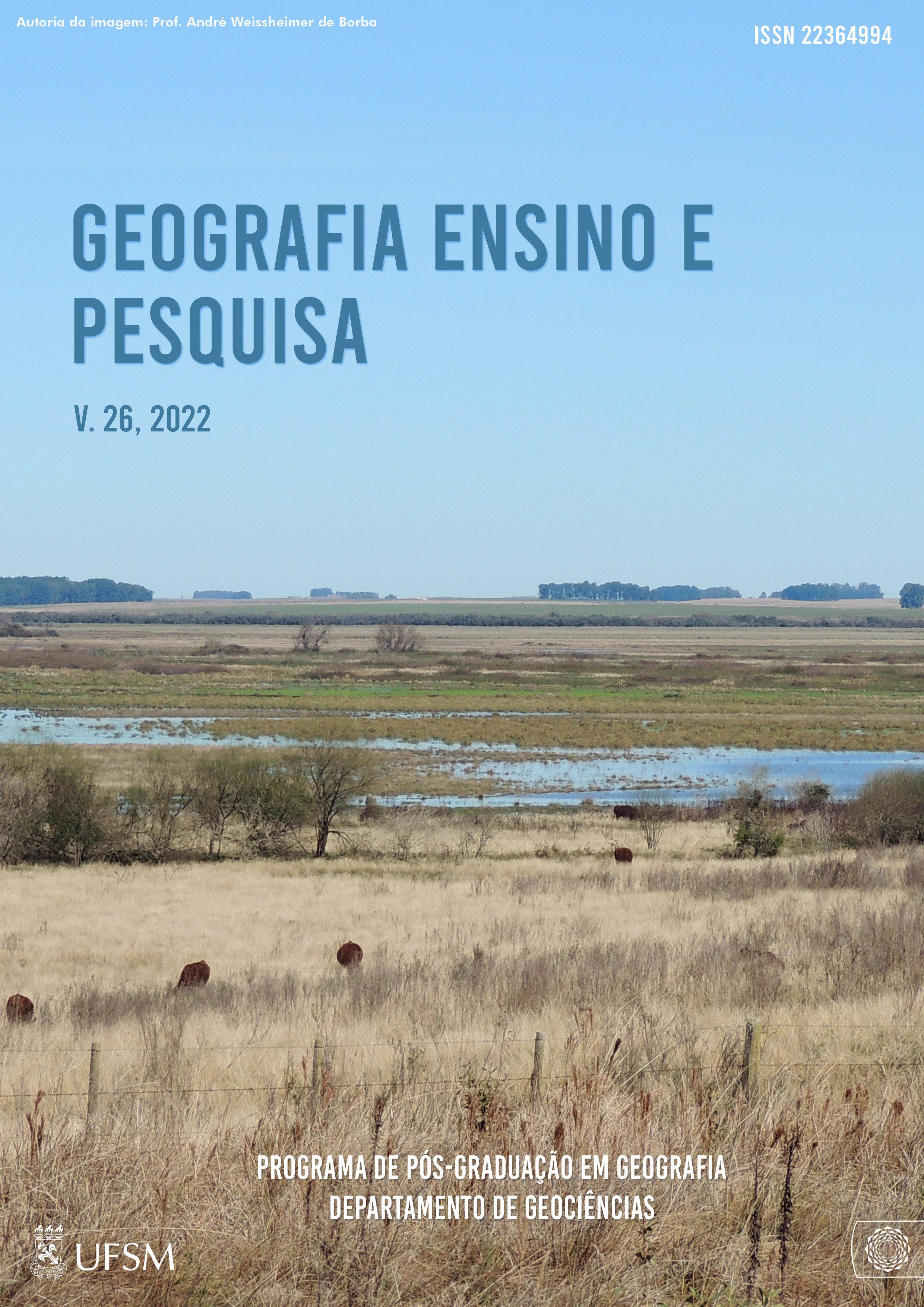The world is changing, now what? Challenges for teaching and learning Geography in pandemic times
DOI:
https://doi.org/10.5902/2236499463425Keywords:
Geography teaching, Covid-19, Technology and education, School geographyAbstract
This work discusses the effects of the Covid-19 pandemic in the Geography teaching-learning. For this, a revisit to the history of the scientific discipline is carried out, highlighting its constitutive problems and the instability of its epistemological basis. This fragility is reflected in school Geography since the discipline at school is crossed, like the scientific one, by external interests. Therefore, we recall the evidence already present in the bibliography that it is necessary to rethink the mnemonic and descriptive Geography that is taught at school, in the sense of constituting a knowledge that is living and that explains the students’ reality through spatial thinking. In this way, we analyze that the Covid-19 pandemic, as tragic as it is, also presents possibilities for teaching Geography focused on technology, which is why we present some tools that can be used by teachers. We conclude, therefore, that the pandemic situation, even if temporary, can have permanent effects on the establishment of the role and importance of school Geography.
Downloads
References
BRABANT, J.-M. Crise da Geografia, Crise da Escola. In: OLIVEIRA, A. U. DE; BRABANT, J.-M.; VESENTINI, J. W.; VLACH, V. R. F.; SANTOS, D.; CARVALHO, M. B. DE; MORAES, A. C.; WETTSTEIN, G. (Org.). Para onde vai o ensino de Geografia? São Paulo: Contexto, 1970.
CALLAI, H. C. A formação do profissional da Geografia: o professor. Ijuí: Ed. Unijuí, 2013.
CASTELLAR, S.; VILHENA, J. Ensino de Geografia. São Paulo: Cengage Learning, 2011.
CAVALCANTI, L. DE S. Bases teórico-metodológicas da Geografia: uma referência para a formação e a prática de ensino. In: CAVALCANTI, L. DE S. Formação de professores: concepções e práticas em Geografia. Goiânia: Vieira, 2006.
FERRETI, F. Pierre Deffontaines e as missões universitárias francesas no Brasil: geopolítica do conhecimento, circulação dos saberes e ensino da geografia (1934-1938). Boletim Goiano de Geografia, Goiânia, v. 36, n. 1, p. 04–26, mar. 2016. Disponível em: https://revistas.ufg.br/bgg/article/view/40362. Acesso em: 4 dez. 2020. DOI 10.5216/bgg.v36i1.40362.
GEORGE, P.; GUGLIELMO, R.; KAYSER, B.; LACOSTE, Y. A Geografia Ativa. 5. ed. São Paulo: Difel, 1980.
GOMES, P. C. DA C. Geografia e modernidade. Rio de Janeiro: Bertrand Brasil, 1996.
HOBSBAWM, E. A era do capital: 1848-1875. Rio de Janeiro: Paz e Terra, 2015.
LACOSTE, Y. A Geografia: isso serve, em primeiro lugar, para fazer a guerra. 18. ed. São Paulo: Papirus, 2010.
MORAES, A. C. R. Geografia: pequena história crítica. São Paulo: Annablume, 2004.
PONTUSCHKA, N. N.; PAGANELLI, T. I.; CACETE, N. H. Para ensinar e aprender Geografia. São Paulo: Cortez, 2007.
SANTOS, M. Por uma Geografia Nova: da Crítica da Geografia a uma Geografia Crítica. 6. ed. São Paulo: EdUsp, 2008.
SOBRE a Wikipédia. Disponível em: https://pt.wikipedia.org/wiki/Especial:Ligação_permanente/54546779. Acesso em: 9 set. 2020.
TOKARNIA, M. Um em cada 4 brasileiros não tem acesso à internet, mostra pesquisa. Jornal. Disponível em: https://agenciabrasil.ebc.com.br/economia/noticia/2020-04/um-em-cada-quatro-brasileiros-nao-tem-acesso-internet. Acesso em: 8 set. 2020.
VESENTINI, J. W. Geografia Crítica e Ensino. In: OLIVEIRA, A. U. DE; BRABANT, J.-M.; VESENTINI, J. W.; VLACH, V. R. F.; SANTOS, D.; CARVALHO, M. B. DE; MORAES, A. C.; WETTSTEIN, G. (Org.). Para onde vai o ensino de Geografia? São Paulo: Contexto, 1970.
Published
Versions
- 2022-09-26 (2)
- 2022-04-20 (1)
How to Cite
Issue
Section
License
Copyright (c) 2022 Geografia Ensino & Pesquisa

This work is licensed under a Creative Commons Attribution-NonCommercial-ShareAlike 4.0 International License.
The journal Geografia – Ensino & Pesquisa will obtain the auctorial rights for all published texts. This also implies that the text can be published anywhere in the world, including all rights on renewal, expansion and dissemination of the contribution, as well as other subsidiary rights. The author’s get permission to publish the contribution in other medias, printed or digital, may be in Portuguese or translation, since the publication is credited to Revista Geografia – Ensino & Pesquisa.The journal Geografia – Ensino & Pesquisa will obtain the auctorial rights for all published texts. This also implies that the text can be published anywhere in the world, including all rights on renewal, expansion and dissemination of the contribution, as well as other subsidiary rights. The author’s get permission to publish the contribution in other medias, printed or digital, may be in Portuguese or translation, since the publication is credited to Revista Geografia – Ensino & Pesquisa.







